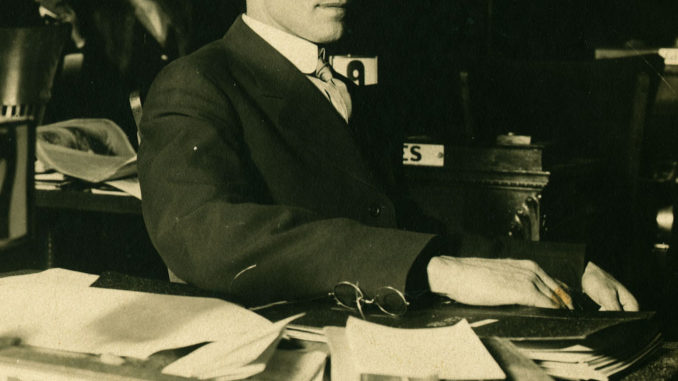
By Jenna Allen
CSU Source
If you can decipher century-old cursive handwriting, Colorado State University Libraries needs your help.
The Water Resources Archive is launching a pilot project to crowdsource transcriptions of three diaries written by Delph Carpenter, an influential water lawyer, state senator and river commissioner in Colorado in the early to mid-1900s.
Considered the “Father of Interstate River Compacts,” Carpenter kept daily diaries, which chronicle his activities over 15 years during the height of his career. He is best known for writing, negotiating and promoting the 1922 Colorado River Compact, a seven-state agreement on the allocation of water rights in the Colorado River basin, which remains in place today.
The pilot will run through April 30, with volunteers transcribing the diaries through a popular online transcription platform, From the Page. If the pilot is successful, the remainder of Carpenter’s 14 diaries will be transcribed in the same way, to make a significant piece of Colorado water history more accessible to modern researchers.
Handwriting challenge
Carpenter’s loose, cursive handwriting combined with sometimes cryptic notes and sentences have made reading the diaries a challenge for researchers.
“Handwritten text can be difficult to read, and impossible to electronically search. With transcription, both are easier,” says Patty Rettig, water archivist at the Libraries. “Transcribing Carpenter’s diaries will make them more accessible and searchable, which is critical for researchers who need primary sources related to Colorado history, water law and policy, or natural resource management.”
After editing by library staff, transcriptions will be freely available on Mountain Scholar, a digital repository for academic entities in Colorado and Wyoming, including Colorado State University.
With nearly 700 handwritten pages to transcribe, volunteers can transcribe as many or as few as they are able.
“Every little bit counts. We couldn’t do this without volunteers giving their time and effort,” says Rettig.
For information on how to volunteer, visit the Libraries website. Questions about the pilot project may be directed to Patty Rettig, [email protected]
Support Northern Colorado Journalism
Show your support for North Forty News by helping us produce more content. It's a kind and simple gesture that will help us continue to bring more content to you.
BONUS - Donors get a link in their receipt to sign up for our once-per-week instant text messaging alert. Get your e-copy of North Forty News the moment it is released!
Click to Donate
